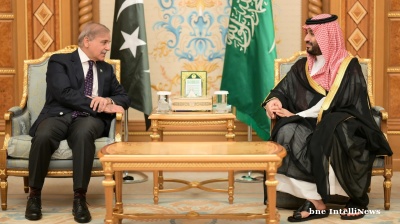Iran's President-elect Masoud Pezeshkian has pledged to engage the country's private sector in the nation's economy and production, as reported by IRNA on July 16.
In a meeting with Iran’s labour union members, he stressed the vital role of production in the country's economy and the importance of collaboration between people and the private sector in addressing economic challenges.
Many in the country have complained in recent years about the economy, often attributing the poor state of things to the state's overbearing influence and meddling in business affairs. Labour unions and activists have been routinely harassed and arrested in some cases over the past few years, with hundreds of thousands of workers severely underpaid and owed months of back pay. Iranian workers are grappling with a sharp decline in living standards as wage increases fail to keep pace with soaring inflation, particularly in food and housing costs, according to recent economic data and worker testimonies.
"I promise to establish and maintain a conducive platform for the people and the private sector, as well as producers, to actively participate in the economic and production sectors together," Pezeshkian said.
Pezeshkian's meeting with business and industry unions stressed that he was fully aware of the poor state of living standards in the country, in part due to the collapse of the Iranian rial (IRR) and US sanctions suffocating economic growth, "The current state of affairs in Iran does not befit the Iranian people, and we should all strive to improve this situation."
He stressed that the government's role is not to engage in production but to create an environment that promotes collaboration between people and the private sector to tackle fundamental production and economic issues.
This comment may come as a breath of fresh air to those in the industrial sector who complained that the former Raisi administration actively thwarted economic growth by closing down subsidies on foreign currency channels and hampered banks' ability to offer loans.
Stressing the need to transcend political rivalries and power struggles, Pezeshkian pledged, "I am prepared to offer opportunities, resources, and authority to those capable of resolving challenges, with the condition that they be held accountable for their actions if they fail."
While underlining the government's duty to create a favourable environment for industrial and commercial activities, President-elect Pezeshkian also stressed the importance of addressing the needs of the less privileged and the impoverished, emphasising that this is a crucial responsibility of the government.
He also acknowledged that achieving these objectives would require time and the collaborative efforts of experts, academics, and specialists, both domestically and internationally.
"We will exert every effort to lead the society towards a path that upholds the dignity and honour of our people," Pezeshkian added.
Over the past three years, prices of essential goods in Iran have surged by an average of 220%, with some items seeing increases of up to 500%. During the same period, the cumulative rise in minimum wage was only 119.7%, leaving workers struggling to afford basic necessities.
"We haven't been able to buy red meat for years," said a municipal worker in Zahedan, who spoke on condition of anonymity. "We cut back on everything just to pay rent, but even bread and milk prices keep rising."
The oil and gas sector, traditionally one of Iran's most lucrative industries, has not been immune to the economic pressures. Heshmatollah Soleimani, a labour activist in South Pars, reported that skilled workers are increasingly seeking employment in neighbouring countries due to significantly better wages and living conditions.
"Unfortunately, skilled workers are migrating because of poor living conditions," Soleimani told ILNA. "When they see how much higher wages and working conditions are in regional countries, they don't hesitate to leave."
The situation has become so dire that there have been reports of worker suicides due to financial distress, even in the oil industry.
Government officials have highlighted efforts to improve labour conditions, including drafting amendments to labour laws and increasing the number of workplace safety committees. However, workers have criticised these measures as inadequate in addressing the core issue of declining purchasing power.
"What good are committees and draft laws if I can't even buy a kilo of meat a month?" said a petrochemical worker from Ilam province, who also requested anonymity.
"Real progress would mean no longer feeling ashamed in front of my children because I can't provide for them."
News

Iran conducts evening ballistic missile test at Semnan facility
Iran conducts evening ballistic missile test at Semnan range with Sejjil-class system, residents report dramatic launch amid heightened security around military facility.

Pakistan gives Saudi Arabia a landmark Article 5 collective security guarantee
In what is likely to be a game-changing decision, Pakistan, a nuclear power, has given Saudi Arabia an Article 5-like collective security guarantee.
_1758207765.jpg)
Latin America's development gains under threat as one in four live in poverty, UN report finds
UNDP warns of stagnation and rising vulnerability across the region amid "overlapping crises".

GCC's Defence Council approves measures to strengthen defence integration following Israeli attack
Gulf Defence Council condemns Israeli attack on Qatar, approves enhanced intelligence sharing and joint military exercises to strengthen regional defence integration mechanisms.

.jpg)

